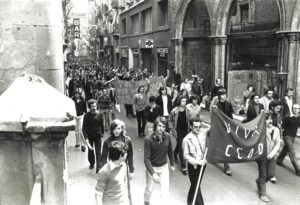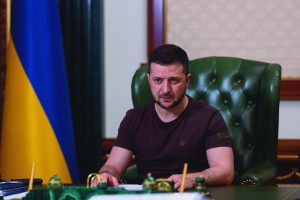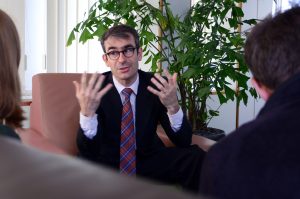Dietmar J. Wetzel, MSH Medical School, Hamburg & University of Basel Cover image: Salvador Allende Square, Paris (7th Arrondissement), November 12, 2023, March against anti-Semitism. National Rally elected officials, Marine Le Pen and Jordan Bardella surrounded by journalists. Siren-Com, CC BY 4.0, via Wikimedia Commons. 1. Introduction – Memory in a fragmented Europe1 In an …
Kostis Kornetis, Universidad Autónoma de Madrid. Academic Advisor of the Commissioner for the Commemoration of “Spain in Freedom: 50 years” Cover image: Screenshots from the video of the campaign Democracy Is Your Power, presented as the closing highlight of the Spain in Freedom commemoration. The word ‘restless’ in this article’s title echoes Inquietud. Libertad y …
In the 1970s, the collapse of the Estado Novo (New State) and the Francoist state took place, two of the longest-lasting dictatorships in the contemporary history of Western Europe. This year marks half a century since the military coup carried out by officers of the Armed Forces Movement (MFA) that overthrew Prime Minister Marcelo Caetano, leading to the Carnation Revolution on 25 April 1974. Next year will mark 50 years since the death of the dictator Francisco Franco on 20 November 1975, who became head of state during the Spanish Civil War (1936-1939) and the beginning of the political shift towards the transition to democracy in Spain.
Georges Mink. Emeritus Director of Research in the Institute of Political Social Sciences at the French National Centre for Scientific Research (ISP-CNRS), European Civilization and History Chair, dedicated to the memory of Prof. Bronislaw Geremek (College of Europe, Natolin, Poland)
By Sébastien Ledoux. Professor of History University of Paris 1 Panthéon-Sorbonne
Celeste Muñoz Martínez, Lecturer in the History of Africa, University of Barcelona Cover picture: View of the room Rituals and Ceremonies, Musée royal de l’Afrique centrale | © MRAC, Tervuren, photo Jo Van de Vijver In 2006, then British Prime Minister Tony Blair caught the world by surprise when he issued an unprecedented apology for …
Picture: Horst Hoheisel, Die Tore der Deutschen, 1997, lighting display on the Brandenburg Gate. By Horst Hoheisel, Artist Aleida Assmann, who will be awarded the Peace Prize of the German Book Trade together with her husband Jan Assmann this year (14 October 2018), has chosen one of my works (1) as the title image for …
All images by Ana Milošević By Ana Milošević, a researcher at the University of Leuven (KU Leuven), Belgium, affiliated with the Faculty of Social Sciences and the LINES Institute (Leuven International and European Studies). In 2014, the Swedish artist Jonas Dahlberg won a competition for a memorial to the victims of the Utøya …
Picture: Plenary hall of European parliament in Strasbourg, April 16, 2013 | Ikars, Shutterstock.com By Markus J. Prutsch, Fellow of the Heidelberg Academy of Sciences and Humanities and the University of Heidelberg, leader of the international research project Science, Numbers and Politics Introduction One of the most powerful tools in welding political identity is …
Picture: Johan François © European Commission EACEA. Interview to Gilles Pelayo, Head of Unit of the programme Europe for Citizens, Education, Audiovisual and Culture Executive Agency (EACEA) What is the specific role of the Education, Audiovisual and Culture Executive Agency? The European Commission delegates the management of some EU programmes to Executives …









